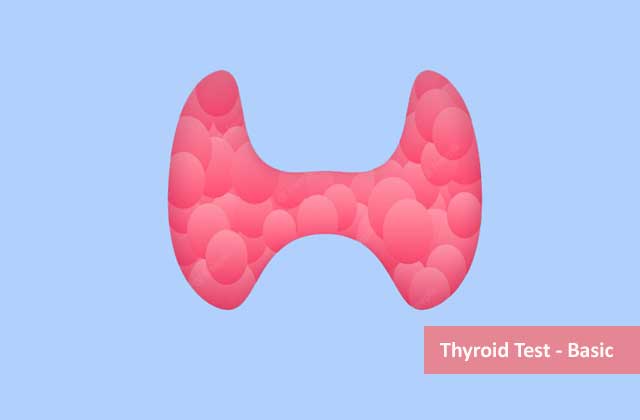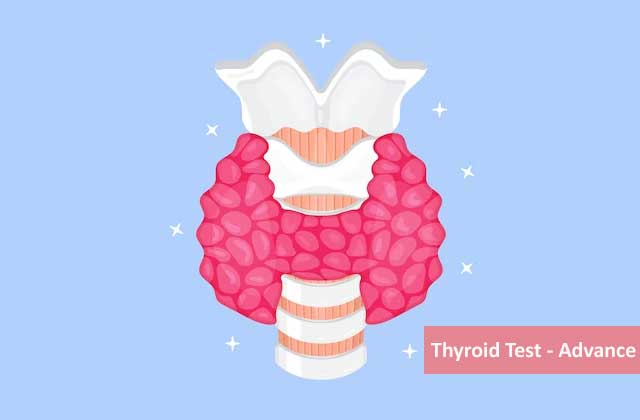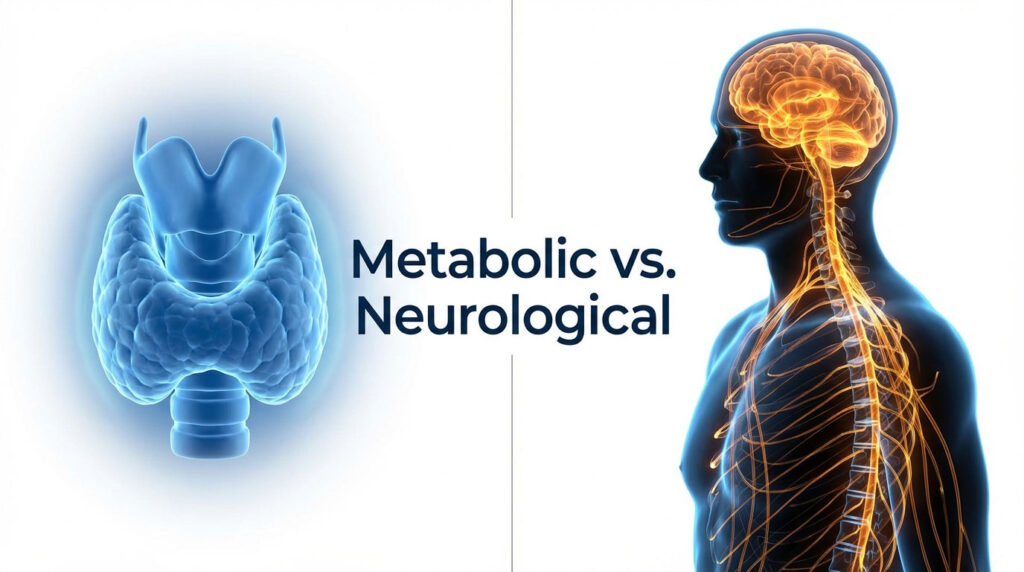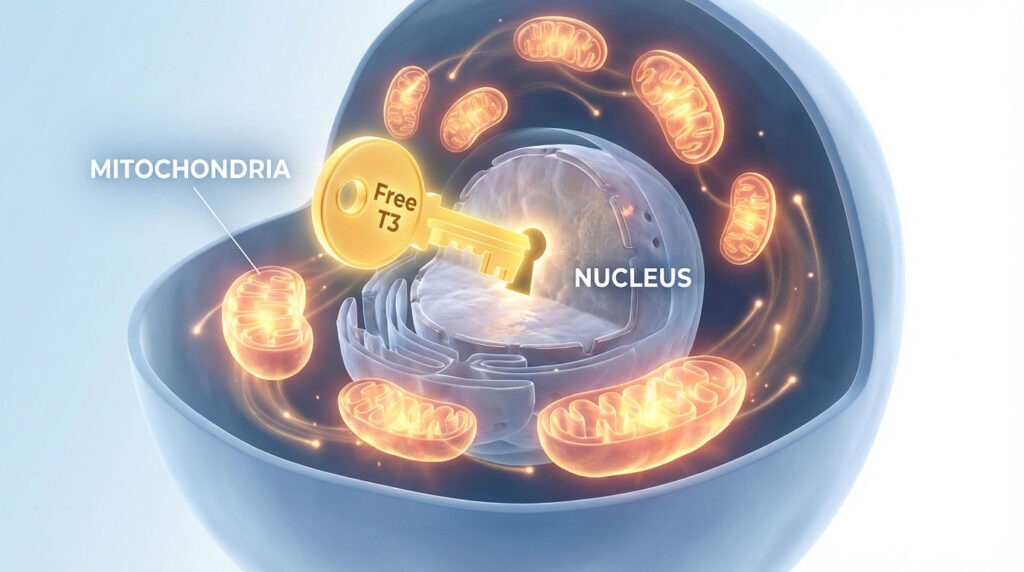Thyroid Test (Total T3, Total T4, TSH) - Basic
Thyroid (3)
- THYROID STIMULATING HORMONE (TSH)
- TOTAL THYROXINE (T4)
- TOTAL TRIIODOTHYRONINE (T3)
What is T3, T4, and TSH Test?
The T3 T4 TSH test is a blood test that measures your body’s levels of thyroid hormones. The thyroid gland in our body produces two hormones, T3 and T4, which help regulate metabolism, body temperature, and energy levels. The thyroid gland is controlled by another hormone called TSH, produced by the pituitary gland.
The thyroid test basic is a screening test that can help detect thyroid problems. However, it is important to note that abnormal results do not necessarily mean that you have a thyroid disorder, and further testing may be required to confirm a diagnosis. It is recommended that you discuss your results with your doctor.
About T3, T4, and TSH Blood Test
Learn everything about thyroid function test T3, T4, and TSH before you book lab test online. Understand the why, how, and what of this test.
Why Do I Need T3, T4, and TSH Test Done?
The T3, T4, and TSH test package is a simple and effective way to diagnose thyroid problems and monitor the effectiveness of thyroid treatment. If you’re experiencing symptoms of thyroid dysfunction, your healthcare provider may recommend this test as part of your diagnostic workup.
The following symptoms should be considered before getting a thyroid profile T3, T4, and TSH test.
- Fatigue
- Weight Changes
- Mood Swings
- Weight Loss
- Family history of thyroid disease
What Does T3, T4, and TSH Tests Measure?
To understand what the T3 T4 TSH tests measure, it’s important to look at them individually.
- T3 (triiodothyronine): It measures the level of the active thyroid hormone in your bloodstream. It’s produced by the thyroid gland and plays a key role in regulating your metabolism, body temperature, and energy levels.
- T4 (thyroxine): It measures the level of the inactive thyroid hormone in your bloodstream. It’s also produced by the thyroid gland and is converted into T3 in the body. T4 provides a reserve of thyroid hormone that can be used to produce T3 as needed.
- TSH (thyroid-stimulating hormone): measures the level of a hormone produced by the pituitary gland in response to signals from the hypothalamus. TSH stimulates the thyroid gland to produce T3 and T4, so elevated levels of TSH may indicate an underactive thyroid gland, while low levels of TSH may indicate an overactive thyroid gland.
How Do I Prepare For the T3, T4, and TSH Tests?
Before going for your thyroid function tests T3 T4 TSH, here’s you can mentally and physically prepare yourself.
- Talk to your healthcare provider about any medications or supplements you’re taking, as they may affect the accuracy of the test results. You may need to stop taking certain medications or supplements for a period of time before the test
- Follow any instructions your healthcare provider gives you about fasting before the test. In most cases, you’ll need to fast for several hours before the test to ensure accurate results. However, you can usually still drink water during this time
- Avoid strenuous exercise before the tests, as this can affect your hormone levels and alter the results
- Inform your healthcare provider if you’re pregnant, as pregnancy can affect your thyroid hormone levels
- Arrive at the lab on time for your scheduled blood draw. The test usually involves a simple blood draw from your arm, and the process typically takes just a few minutes
Finding T3, T4, and TSH Blood Test
Should you book blood test online to check your T3, T4, and TSH normal levels or go to the nearest clinic and get it done by a medical professional? Let’s Find Out.
Can I Take T3, T4, and TSH tests At-Home?
Yes, the tests can be taken at home. Healthcareontime at-home lab testing service in association with thyrocare provides a convenient and efficient way to get important medical tests done from the comfort of your own home, without the need for a doctor’s visit or a trip to a lab. It’s important to note that it’s always a good idea to consult with a healthcare provider about any concerns or questions you may have about your test results.
How Much Does T3, T4, and TSH Tests Cost?
The T3 T4 TSH test cost varies depending on various factors, such as where you live, the healthcare provider or a laboratory that performs the test, and whether or not you have health insurance coverage.
Test Results Interpretation
You received your test results but still need help determining if they fall under the normal range. Read this section to know if your results range between the T3, T4, and TSH normal range.
What Do T3, T4, and TSH Test Results Mean?
Diagnosing the tests will determine the number of hormones produced by the pituitary gland. Whether they fall under the T3, T4, or TSH normal range or are slightly more than normal – the diagnosis can help you with an adequate cure in case you have any thyroid issues.
What Is T3, T4, TSH Test Normal Range?
Need to understand whether your test results come under the T3 T4 TSH normal range? Read this section to decipher your results.
- T3 (triiodothyronine): The normal range is usually between 100-200 ng/dL. High levels of T3 may indicate an overactive thyroid gland (hyperthyroidism), while low levels of T3 may indicate an underactive thyroid gland (hypothyroidism).
- T4 (thyroxine): Normal range is usually between 5-11 μg/dL. High levels of T4 may indicate hyperthyroidism, while low levels of T4 may indicate hypothyroidism.
- TSH (thyroid-stimulating hormone): Normal range is usually between 0.4-4.5 mIU/L. High levels of TSH may indicate an underactive thyroid gland, while low levels of TSH may indicate an overactive thyroid gland.
If your levels fall outside of the normal range, your healthcare provider will likely recommend additional tests and evaluations to determine the underlying cause of the abnormal results. These may include imaging tests, such as a thyroid ultrasound, or further blood tests to evaluate other hormones and markers of thyroid function.
What Medical Conditions Can Cause High T3, T4, and TSH Levels?
If your test results show higher than normal levels, the following medical conditions might be causing your thyroid symptoms.
- Hyperthyroidism: Hyperthyroidism occurs when the thyroid gland produces too much thyroid hormone, leading to elevated T3 and T4. In turn, this can cause the pituitary gland to produce less TSH, resulting in low levels of TSH
- Thyroid nodules or goiter: These are growths or enlargements of the thyroid gland that can cause it to produce too much thyroid hormone and result in elevated T3 and/or T4 levels
- Thyroiditis: This refers to inflammation of the thyroid gland, which can cause it to release excessive amounts of thyroid hormone and result in high T3 and/or T4 levels.
- Pregnancy: During pregnancy, the body’s demand for thyroid hormone increases, which can cause the thyroid gland to produce more thyroid hormone and result in elevated T3 and/or T4 levels.
What Medical Conditions Can Cause Low T3, T4, and TSH Test Levels?
If your test results show lower than normal levels, the following medical conditions might be causing your thyroid symptoms.
- Hypothyroidism: Hypothyroidism occurs when the thyroid gland doesn’t produce enough thyroid hormone, resulting in low levels of T3 and/or T4. In turn, this can cause the pituitary gland to produce more TSH, resulting in elevated levels of TSH
- Hashimoto’s thyroiditis: This is an autoimmune disorder that causes inflammation of the thyroid gland, leading to reduced production of thyroid hormone and low T3 and/or T4 levels
- Pituitary gland dysfunction: The pituitary gland produces TSH, so dysfunction of this gland can lead to low TSH levels and subsequently low T3 and/or T4 levels
- Congenital hypothyroidism: This is a rare condition in which babies are born without a functioning thyroid gland or with an underdeveloped thyroid gland, leading to low T3 and/or T4 levels
Why Choose HealthcareOnTime?
Convenience at Your Doorstep
Ever wished for healthcare that comes to you? HealthcareOnTime makes it a reality with doorstep lab testing, cutting out clinic hassles. No more queues or travel stress. Experience at-home sample collection, prioritizing health without time constraints. —your path to health, now just a doorstep away!
Affordable Testing with Thyrocare Partnership
Experience cost-effective lab testing at-home with HealthcareOnTime’s exclusive partnership with Thyrocare. Benefit from competitive prices while ensuring precise results. Our collaboration with Thyrocare Technologies Limited guarantees affordability without compromising on the accuracy and reliability of your lab test.
Comprehensive Health Screening
At HealthcareOnTime, we’ve got your back with our comprehensive health checkup packages! Take charge of your well-being by booking online. These packages empower you to stay ahead, catching potential issues early for timely management. It’s like having a health ally, and making informed decisions for a healthier, happier life.
Ref Links:
More Related Tests
Why To Book with HealthCareOnTime

17 Crores+ Samples Processed

World Class Technology Labs

25+ Years of Trust & Experience

Free Home Collection
FAQs Around Thyroid Test (Total T3, Total T4, TSH) - Basic
What are T3, T4, and TSH?
T3, T4, and TSH are all hormones important for the proper functioning of your thyroid gland, which is located in your neck. Your thyroid gland produces T3 and T4, which regulate metabolism, heart rate, and body temperature. On the other hand, TSH is produced by your pituitary gland and helps control the production of T3 and T4.
What is the normal range of T3, T4, and TSH in kids?
The normal range for T3 in kids is between 80-220 ng/dL, while the normal range for T4 is 5 – 13.5 ug/dL. For TSH, the normal range is typically between 0.5-5.0 mIU/L.
What is the normal range of T3, T4, and TSH in females?
The normal range for T3 in adult women is typically between 80-220 ng/dL, while the normal range for T4 is between 4.5-12.5 ug/dL. For TSH, the normal range is generally between 0.4-4.0 mIU/L, although some healthcare providers may use a slightly different reference range.
Is fasting required for the T3, T4, and TSH tests?
More often than not, fasting is not a requirement for T3, T4, and TSH tests.
Why are newborns screened for blood levels of TSH T3 and T4?
Newborns are screened for blood levels of TSH (thyroid-stimulating hormone), T3 (triiodothyronine), and T4 (thyroxine) to check for any potential thyroid problems. The thyroid gland plays a critical role in regulating your baby’s body’s metabolism, growth, and development.
What is the normal range for T3, T4, TSH in the first trimester?
The T3 T4 TSH normal range in females in the first trimester is typically between 0.1 and 2.5 mIU/L, slightly lower than the non-pregnant range. The normal range for T4 levels is usually between 6.0 and 12.0 ug/dL, which is also slightly lower than the non-pregnant range. The normal range for T3 levels can vary depending on the testing method but generally falls between 100 and 200 ng/dL.










